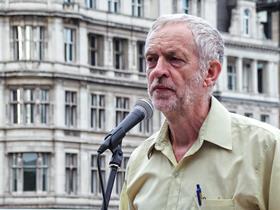Labour leader ‘very disappointed’ as housing associations back controversial roll-out

The Labour leader Jeremy Corbyn has blasted housing associations for accepting a controversial roll-out of Right to Buy.
In an exclusive interview with Building, conducted in his North Islington constituency last Friday, Corbyn said he was “very disappointed” that housing associations were set to adopt the policy.
Yesterday the National Housing Federation (NHF) confirmed its members had overwhelmingly backed voluntarily adopting right to buy – a result that was widely-expected when Building spoke to Corbyn.
Corbyn attacked housing associations for increasingly acting “solely as a housing company” and said their properties should be retained “within the social rented sector”.
He said: “I’m very disappointed if they decide to do this. Housing associations were formed to provide housing for people that need it, not to run themselves solely as a housing company - which is the direction they seem to be going in.”
Corbyn trumpeted shadow housing minister John Healey’s proposal - first outlined at last week’s Labour party conference - of a 100,000 homes-a-year council housing building programme, which he said would have a “massive” beneficial impact “all the way down the building supply chain” and on the public purse through a lower housing benefit bill.
Last week Labour vowed to fight the extension of right to buy to housing associations and Healey wrote to three watchdogs - the Homes and Communities Agency, the Charity Commission and the National Audit Office - urging them to intervene to halt the policy.
The Charity Commission confirmed yesterday it is investigating the policy’s compatibility with charity law and said only “some” of its concerns have been addressed so far.
Speaking at the Conservative party conference yesterday, communities secretary Greg Clark defended the right to buy deal with housing associations, saying: “We’re extending the Right to Buy from council tenants to housing association tenants. In return, for every home that is bought by a tenant, we will ensure that a new one is built, doing the vital work of increasing the homes that we want.
“Expanding the mission of housing associations to become organisations that promote homeownership too and extending the opportunity of ownership to millions of people who have never had it before.”
Under the voluntary right to buy deal struck between Clark and the NHF, housing associations will be fully-reimbursed for any discounts offered under Right to Buy – paid for through the sale of high-value council homes.
Housing associations will retain exemptions under certain circumstances – for instance where a property is in a rural area and cannot be replaced, or where a home is adapted for special needs tenants – but in these cases tenants will be offered a portable voucher enabling them to buy another housing association home within its or another association’s stock.
Housing association bosses said the voluntary Right to Buy deal was the best availabe outcome, given the risk of the Conservatives legislating to impose the policy on the sector if the voluntary deal was rejected, which they feared could have resulted in associations being reclassified as public rather than independent bodies.
David Montague, chief executive of L&Q, said: “A voluntary deal is better for housing associations as it involves greater flexibility. It reduces the risk of reclassification.
“We have a responsibility to support a manifesto commitment. We believe in home ownership and this is a better offer for our tenants.
“The biggest challenge now is to replace homes sold on a one-to-one basis. We need to get moving to put spades in the ground.”
Another housing association chief executive, who preferred to remain anonymous, said he voted to back the deal as the NHF struck a deal where “we don’t lose asset value” due to discounts being refunded by government.
But this source slammed the “jam jar accounting” approach of selling off council homes to pay for it: “To sell off council houses is wrong - it’s opportunistic. The sale of council homes comes from a value system which says an average person can’t afford it, so therefore why should a poor person live in it.”
A full interview with Jeremy Corbyn will feature in this week’s issue of Building



























3 Readers' comments